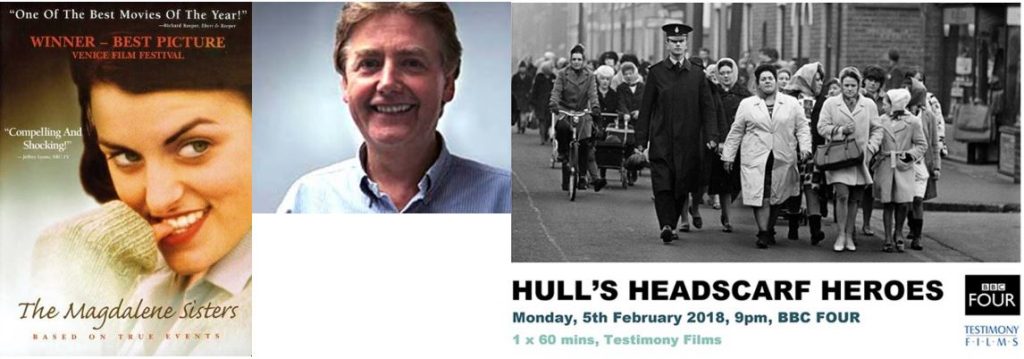Over ten years ago, Liz O’Donnell recorded the memories of more than 40 people in the North East who, as children during the 2nd World War, had experienced the huge dislocation caused by mass evacuation. Current discussions about the damaging impact of disrupted education caused by the pandemic led her to dig out her research notes, to look at the evacuees’ recollections of their own disturbed schooling, especially their feelings about its long-term effects. All the examples here are of evacuation to villages in Northumberland, mostly from the industrial areas of Tyneside. Summaries and recordings of all the interviews are available at Northumberland Archives, Woodhorn.
Continue readingTag Archives: interview
Podcast Episode: Steve Humphries and his 20 rules for intimate interviewing

Centre – Steve Humphries
Right – ‘Hull’s Headscarf Heroes’ by Testimony Films, 2018.
From Stockton to Jarama: Recalling those who fought Franco’s fascists from the North East
Matt Perry reviews Northern Stage‘s recent production of The Ballad of Johnny Longstaff
Continue readingFed Up: the Sonic Narrative
Sound Artist, Sound Designer, and Abstract Composer Matthew Tuckey reflects on the creation of an abstract sound composition in response to the Oral History Unit & Collective’s research with the Newcastle West End Foodbank.
Continue readingFrom reflective to prospective practice: an oral history of the Lockerbie disaster, 1988
Last year, Dr Andy Clark was awarded a British Academy / Leverhulme Trust Small Grant to conduct a scoping project on the Lockerbie disaster, 1988. Working with Dr Colin Atkinson, Lecturer in Criminology at UWS, they will conduct interviews with a number of witnesses involved in the aftermath of the disaster. In this Lug post, Andy reflects on how to prepare for such a project. There is an extensive literature on reflections of oral historians once projects have been completed, but in this piece, Andy discusses his thoughts and approaches before beginning the interview process. Continue reading
Foodbank Histories: Placement Reflection by Jack Hepworth
Foodbank Histories is a collaborative project between Newcastle West End Foodbank, Northern Cultural Projects, and Newcastle University Oral History Unit & Collective. The project began in 2018, recording approximately 30 short oral history interviews with foodbank clients, volunteers, and supporters. Over the past five weeks, PhD candidate Jack Hepworth has completed a short-term placement on Foodbank Histories, funded by the Newcastle University Social Justice Fund. Here he reflects on his experience.
A historiography of erasure: a case study of Japanese experiences in Canada
In advance of his paper for our oral history seminar series on Wednesday February 27th, Dr Darren Aoki outlines the rationale behind his research into Japanese experiences in Canada at the end of the Second World War. He argues that the participants in his oral history interviews actively reject notions of victimhood in the construction of their identities. Please click here to see the full abstract for Darren’s paper.
Deindustrialisation, Heritage and Memory Network: First Workshop
Research Associate, Andy Clark, has recently been organising and coordinating a new network looking at deindustrialisation, heritage and memory. On Friday 28th September, the network held its first workshop at the Scottish Oral History Centre in Glasgow. In this Lug post, Andy reports on the papers, themes and discussions that emerged throughout the day.
News: New media brings Booker interviews out from the archive
A new film from the British Library features clips from an oral history interview by the Oral History Unit’s Sue Bradley. ‘Behind the Scenes: The Man Booker Prize — Stories from the British Library’s archive‘ is an audio-visual montage created by British Library interviewer Sarah O’Reilly, with voices from in-depth interviews recorded for National Life Stories.
Community Experiences of Serious Organised Crime in Scotland
In this Lug post, Andy Clark discusses his experience conducting research for the Scottish Government’s Cabinet Secretary for Justice. Along with a team of researchers, he contributed to, and co-authored, a major report focused on community experiences of Serious Organised Crime in Scotland. He reflects on utilising oral history methods to examine current experiences and problems in relation to organised crime, and contributing to a policy report.
